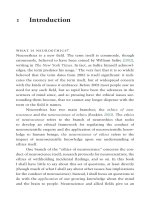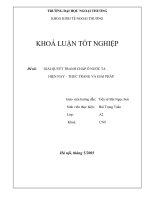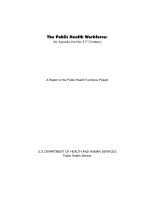public utilities management challenges for the 21st century phần 1 ppt
Bạn đang xem bản rút gọn của tài liệu. Xem và tải ngay bản đầy đủ của tài liệu tại đây (306.1 KB, 11 trang )
Utility Management Challenges for the 21
st
Century: Managing in an Era of Uncertainty
April 2009
Uncertainty Challenges
l Economy: What Does the Future Hold
l Demand and Supply Forecasting
l Infrastructure Repair and Replacement
l Climate Change/Variability
l Finances/Rates/Affordability
l Workforce Challenges
Asset Management as a Framework to
Address Uncertainty
“Meeting agreed
customer and
environmental
service levels
while minimizing
life cycle costs”.
To Become an Asset Management Based
Organization You Need To Address
1. Customer and environmental service levels
2. Risk assessment and quantification
3. Life Cycle costs analysis using triple bottom line
4. Long Range Planning
5. Asset and data systems
6. Rational Rates and Affordability
7. Clarity of Organizational Roles and Responsibilities
8. Formal Capital Decision Making Processes
9. Track and Measure Results
10. Benchmarking
Customer Service Levels and
Performance Indicators
l Find out from customers what services are
most important to them
l Set service levels and make investments
needed to meet them-now and into the future
l Establish and measure performance
indicators
Wastewater Service Levels
Category
Category
Service Level
Service Level
Performance Indicators
Performance Indicators
Effective
Effective
Conveyance
Conveyance
(SSO sewer
(SSO sewer
backups)
backups)
By 2020, no more than one
By 2020, no more than one
sewer backup in 5 years, on
sewer backup in 5 years, on
average, at any location,
average, at any location,
caused by a problem with the
caused by a problem with the
SPU sewer system.
SPU sewer system.
Number of annual
Number of annual
SSOs
SSOs
as reported by
as reported by
location.
location.
Wet Weather
Wet Weather
Combined Sewer
Combined Sewer
Overflows
Overflows
By 2020,
By 2020,
CSOs
CSOs
shall be limited
shall be limited
to an average of one untreated
to an average of one untreated
discharge per CSO per site per
discharge per CSO per site per
year.
year.
Number of precipitation
Number of precipitation
-
-
related CSO
related CSO
events per CSO site per year.
events per CSO site per year.
Dry Weather
Dry Weather
Combined Sewer
Combined Sewer
Overflows
Overflows
No dry weather
No dry weather
CSOs
CSOs
are
are
currently allowed by regulation.
currently allowed by regulation.
Number of total dry weather CSO
Number of total dry weather CSO
events per year in
events per year in
SPU
SPU
’
’
s
s
system.
system.
Problem
Problem
Response
Response
SPU shall respond quickly and
SPU shall respond quickly and
effectively to problems with
effectively to problems with
potential health consequences.
potential health consequences.
80% of high priority sewer
80% of high priority sewer
backup/overflow problems responded
backup/overflow problems responded
to within 1 hour.
to within 1 hour.
80% of high priority sewer
80% of high priority sewer
backup/overflow problems have service
backup/overflow problems have service
reinstated within 6 hours.
reinstated within 6 hours.
Performance Indicators
YTD Backups in City System
0
50
100
150
JF MAMJ JASOND
2007 Actuals
Target Maximum
2008 Actuals
Performance Indicators
% DWW Emergency Responses Within Targeted Time
0%
50%
100%
Target Min = 80%
November 2006
January 2008
Performance Indicators
Customers With Water Outages
> 4 Hours Cum ulative ly
0
1000
2000
3000
4000
5000
6000
7000
8000
JF MAMJ J ASOND
# customer
s
Monthly A c tual Cumulative A c tual
Cumulative Target Max
Performance Indicators
% Drinking Water Emergency Responses
Within Targeted Times
0%
10%
20%
30%
40%
50%
60%
70%
80%
90%
100%
JF MAMJ JASOND
% Compliance
Target Min
Performance Indicators
Repeat Misses per 10,000 Stops for
Can Service
0.00
1.00
2.00
3.00
2006 2007 2008
WMI
USD
Target Max
Performance Indicators
Sick Leave as % of Total Hours Worked
0.0%
1.0%
2.0%
3.0%
4.0%
5.0%
6.0%
Q1 Q2 Q3 Q4
Actual 2005 Dept Actuals Target Max
Risk Assessment
l Understand your highest risk activities
l Understand the likelihood and consequences
of failure of your assets
l Manage based on risk cost and the cost to
mitigate risk
l Reduce asset risk through capital
investments or changed maintenance
practices and response protocols
1. Define failure.
1. Define failure.
Consequence
Consequence
of
of
Failure
Failure
3. Determine Risk
3. Determine Risk
…
…
Risk
Risk
Cost
Cost
=
=
Likelihood
Likelihood
of
of
Failure
Failure
x
x
2. Collect and analyze data.
2. Collect and analyze data.
Risk Assessment
RISK SIGNATURE LEVEL DETERMINANT
Likelihood
Insignificant Minor Moderate Major Extreme
Almost certain MMHCC
Likely MMHCC
Possible LMMHH
Unlikely LLMHH
Rare L L MMM
Consequence
Risk Categories
include:
u Asset and service
reliability
u Environment and
public health
u Financial
u Legal
u Public Trust
u Regulatory
u Safety
u Security
u Workforce
Corporate Risk Management
Corporate Risk Management
An Example: Water Conservation Policy
An Example: Water Conservation Policy
Alternative
Conservation
Baseline
Strategies Description and Performance Measure
Public Trust Risk
Regulatory Risk
Asset and Service
Reliability Risk
Legal Risk
Environmental
Risk
Workforce Risk
Financial Risk
Public Health
Do Nothing
No messa
g
in
g
or incentives. No performance
measure.
Awareness
Campaign
Messaging; no incentives. Less intense than
1% program. Customer survey to assess
effectiveness. Results estimated <.3 MGD
annual savings.
Program to Shave
Peak
Investment
Variable
Less intense than 1% program. Set
performance goal for peak season. Results
could range from <.3 5 MGD peak season
savings.
Low Intensity
Program /
Investment
Less intense than 1% program. Set
performance goal on per capita demand.
Results could be in range of .7 MGD annual
savings.
Medium Intensity
Program /
Investment
Similar intensity to 1% program. Set
performance goal to keep demand flat.
Results could range from 1-1.5 MGD annual
savings.
High Intensity
Program /
Investment
Intensity estimated to be greater than 1%
program. Set performance goal to reduce
total demand. Results could be above 1.5
MGD annual savings.
Asset
Risk Assessment
An Example: Sewer Pipes
An Example: Sewer Pipes
Risk is Minimized by
Risk is Minimized by
Concentrating Limited
Concentrating Limited
Resources on Sewer Pipes
Resources on Sewer Pipes
with the Highest Risk Cost of
with the Highest Risk Cost of
Failure
Failure
0.0000
0.0050
0.0100
0.0150
0.0200
0.0250
0 102030405060708090100
Years Since Installation
Probability of First
Failure Occuring in
Given Year
Asset Risk Assessment
Asset Risk Assessment
Asset Risk Assessment
Long Term Supply and Demand
Planning
l One thing we know about demand forecasting
is as soon as we do a new forecast it is
wrong!
l Demand forecasting is both art and science
l Demand forecasting needs to be dynamic (i.e.
updated frequently)
Actual Water Demand and Past Forecasts
0
20
40
60
80
100
120
140
160
180
200
220
240
260
280
300
320
340
360
1950 1955 1960 1965 1970 1975 1980 1985 1990 1995 2000 2005 2010 2015 2020
Annual MGD
Actual Annual
1967 SWD Forecast
1973 RIBCO Forecast
1980 Complan Forecast Medium
1980 Complan Forecast Medium-Low
1985 Complan Forecast-Medium
1993 WSP Forecast
1997 Revised Forecast
2001 WSP Forecast
2003 Official Forecast
2006 Draft Forecast









